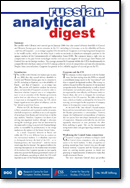The Politics of Welfare Reform in Russia

The Dominance of Bureaucratic Interests
Author(s): Linda Cook
Editor(s): Jeronim Perovic, Robert Orttung, Matthias Neumann, Heiko Pleines, Hans-Henning Schröder
Series: Russian Analytical Digest (RAD)
Issue: 37
Pages: 2-5
Publisher(s): Center for Security Studies (CSS), ETH Zurich; Research Centre for East European Studies, University of Bremen
Publication Year: 2008
